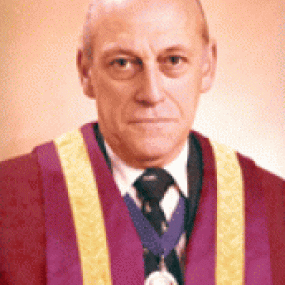Dr John Francis Nunn

07/11/1925 to 09/05/2022
Place of birth: Colwyn Bay, North Wales
Nationality: British
CRN: 512727
Education and qualifications
|
General education |
Wrekin College, Shropshire 1939-43. |
|---|---|
|
Primary medical qualification(s) |
MRCS (Eng.), LRCP (Lond.), 1948 |
|
Initial Fellowship and type |
FFARCS by Election |
|
Year of Fellowship |
1955 |
|
Other qualification(s) |
DA (RCP&S), 1953 |
Professional life and career
Postgraduate career
Immediately after graduation, Nunn joined a University of Birmingham geological expedition to Spitsbergen as medical officer and surveyor. Two months later he returned to undertake house physician posts in paediatrics and general medicine at the United Birmingham Hospitals through 1948-49. As an alternative to two years military national service, he then undertook three years in the Malayan Medical Service, based at Penang from the end of 1949. Placed in the surgical department to “brush up” initially, he became the default anaesthetist and then, because of his increasing self-taught skills, he remained in this role at Penang for the entire three years. Before returning to England early in 1953, he prepared for the 2-part DA exams by a correspondence course, and by June he had passed both parts. Thus qualified he was appointed as a locum registrar in anaesthetics at the Birmingham hospitals, followed by a substantive registrar post. Through the influence of the Professor of Medicine he was able to become a PhD student in Birmingham from 1955. Next, in January 1957 he was appointed Leverhulme research fellow in the new research department of the Royal College of Surgeons in London, where he remained until 1964. Concurrently from 1960 to 1964 he was Hon. Lecturer in Anaesthetics and Teacher at the Postgraduate Medical School, University of London, and Hon. Consultant Anaesthetist at Hammersmith Hospital. In 1964 he was appointed the foundation Professor of Anaesthesia at the University of Leeds and Hon. Consultant Anaesthetist at Leeds General Infirmary. He remained in these posts until 1968, when he moved back to London to be head of the division of anaesthesia of the Clinical Research Centre of the Medical Research Council and Hon. Consultant Anaesthetist at Northwick Park Hospital – continuing in these roles until his retirement in 1991.
Professional interests and activities
Nunn’s major research interest was respiratory physiology in relation to anaesthesia. The thesis for which he was granted his PhD was “Factors influencing the arterial carbon dioxide tension during anaesthesia”. In 1969 he published the first edition of his famous book “Applied Respiratory Physiology” – the text resulted in him being awarded the degree of MD. He went on to publish over 200 papers in peer reviewed journals, the majority on the application of respiratory physiology in anaesthesia and devices used to study it; other topics included the cellular mechanisms of anaesthetics and the biochemical consequences of the interaction of nitrous oxide with vitamin B12. He also co-edited the textbook “General Anaesthesia” (begun by FT Evans and TC Gray) from the 3rd edition (1971) to the 5th edition (1988).
In 1958 Nunn was one of the founders of the Anaesthetic Research Group (which ten years later became the Anaesthetic Research Society). In the Faculty of Anaesthetists, he served on the Faculty Board for 1966-82 and on the Board of Examiners for 1967-73; he was Vice Dean for 1977-79 and Dean for 1979-82. In the Royal College of Surgeons of England he was a member of Council for 1977-82. He was also a member of Council in the Association of Anaesthetists for 1973-76 and 1979-81, serving as Vice President for 1988-90. He was President of the Section of Anaesthetics of the Royal Society of Medicine for 1984-85.
Nunn served on the Editorial Board of the British Journal of Anaesthesia from 1960 to 1990. He participated in British Council and WHO visits to several countries in the 1960s and and 1970s, and was an invited speaker at numerous international conferences up to 1990.
In addition to delivering some 25 eponymous lectures, his awards include Honorary Fellowships of the Faculty of Anaesthetists, Australasian College of Anaesthetists (1984), the Irish Faculty of Anaesthetists (1985), the Royal Society of Medicine (1992), and the Royal College of Anaesthetists (1993). He was awarded honorary doctorates by the University of Turin and the University of Uppsala. Medals received include the Dudley Buxton Medal of the RCoA in 1968, the Faculty Medal of the Faculty of Anaesthetists in 1987, the Sir Ivan Magill Gold Medal of the Association of Anaesthetists in 1988, and the Hickman Medal of the Royal Society of Medicine in 1996. Notably he also received the Excellence in Research Award of the American Society of Anesthesiologists in 1991.
Other biographical information
Besides his amazing scholarship, colleagues of John Nunn have described his qualities of friendship, modesty and wit. He married Sheila Doubleday in September 1949 and they had a son and twin daughters. In retirement he enjoyed his interests in geology, Egyptology, gardening and model engineering. He received the Richardson Award of the Geologists’ Association in 1999, and in 2001 he was elected a Fellow of the Geological Society of London. His research interest extended to climate change on which he published until 2006. Sadly his wife died at the end of 2018 by which time he suffered progressive vascular dementia. He is survived by his son Geoffrey (a retired Consultant Anaesthetist), his two daughters and many grandchildren and great grandchildren.
Author and sources
Dr Alistair McKenzie
Sources and comments:
[1] Royal College of Surgeons of England, Council Minutes of July 1953: DA passes.
[2] Nunn JF. Curriculum Vitae 1991.
[3] Oxford Brookes University. Transcript of interview of Dr JF Nunn by Lady Wendy Ball, 1998.
[4] Nunn JF. Nunn’s Applied Respiratory Physiology. In Maltby JR: Notable Names in Anaesthesia. London: RSM Press Ltd., 2002; 157-9.
[5] Chapter on JF Nunn in Harrison MJ. British Academic Anaesthetists 1950-2000 Vol 1. Wellington, NZ, 2011: 9-36.
[6] Baker AB. Obituary Dr John Francis Nunn. ANZCA Bulletin Spring 2022; 68-69.
